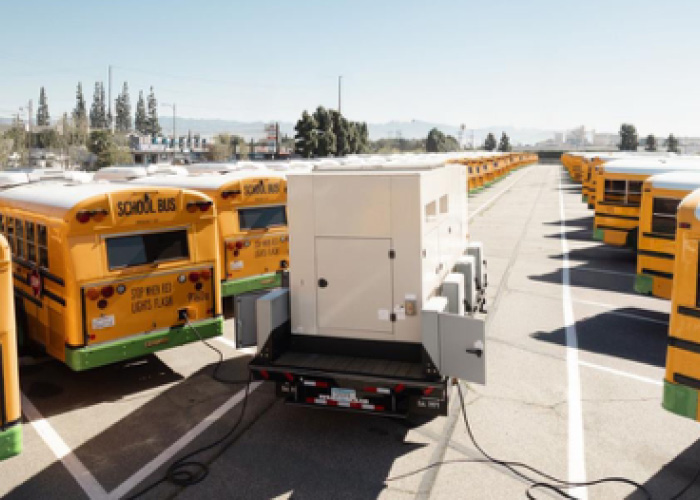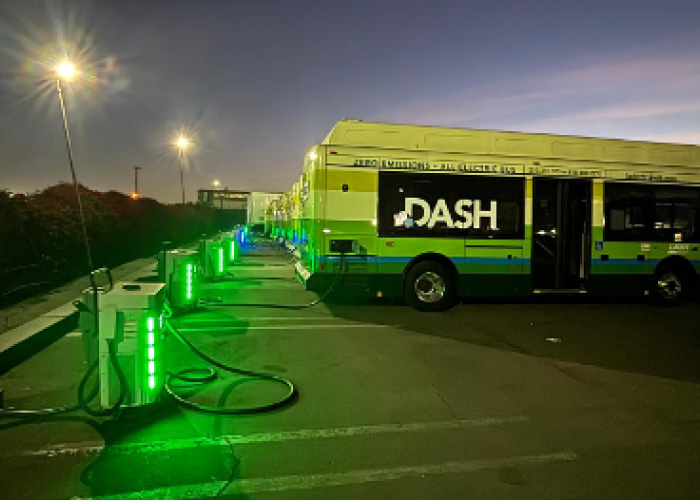
The United States has reached a pivotal moment in its approach to energy and transportation. The increasing adoption of electric vehicles (EVs) presents both opportunities and challenges, particularly in the context of evolving political and environmental directives.
One innovative solution lies in the collaboration between the propane and electric vehicle industries, specifically through the use of propane-powered generators to support EV charging infrastructure.
This partnership not only addresses current energy demands but also navigates the shifting landscape of governmental policies and environmental considerations.
Propane-Powered Generators: Enhancing EV Charging Infrastructure
The expansion of EVs necessitates a robust and reliable charging infrastructure. However, challenges, such as grid capacity limitations and the need for charging stations in remote areas, pose significant obstacles. This innovative approach leverages propane or renewable propane to power a propane generator.
These generators can produce up to 250 kilowatts (kW) of 480-volt power, sufficient to power multiple EV chargers simultaneously. The electricity generated by the propane generator is used to charge the batteries of electric vehicles, providing a reliable and efficient charging solution.
Using propane in this capacity offers several advantages. Propane is a clean-burning fuel, resulting in lower greenhouse gas emissions compared to diesel or gasoline generators. Additionally, propane’s domestic abundance enhances energy security and reduces dependence on imported fuels. The integration of propane generators into the EV charging network not only supports the growing number of electric vehicles but also contributes to a more resilient and environmentally friendly energy infrastructure.
Understanding Off-Grid EV Charging
Off-grid EV charging refers to charging stations that operate independent of the traditional electrical grid. These systems are particularly valuable in areas where grid connectivity is absent or unreliable. By using alternative energy sources such as propane, these stations can provide consistent and dependable charging services to EV users in diverse locations.
The Role of Propane in Off-Grid Charging
Propane, a low-carbon fuel, has emerged as a viable energy source for off-grid EV charging stations. Its attributes make it especially suitable for this application.
- Environmental benefits: Propane combustion results in lower emissions of nitrogen oxides (NOx), carbon monoxide (CO) and carbon dioxide (CO2) compared to conventional diesel generators. In light-commercial microgrid applications, propane offers near-zero NOx and CO emissions, along with a 24% reduction in CO2 emissions compared to diesel.
- Portability and flexibility: Propane-powered charging units are often designed to be portable, allowing for rapid deployment in various locations. This mobility is advantageous for fleet operators and event organizers who require temporary charging solutions.
- Cost-effectiveness: Implementing propane-powered charging stations can be more economical than extending the electrical grid or upgrading existing infrastructure. These systems eliminate the need for costly site preparations and can be installed swiftly, often within 24 hours.
- Energy independence and reliability: Propane’s widespread availability ensures that off-grid charging stations can operate independently of the electrical grid, providing a reliable power source even during grid outages. This resilience is crucial for maintaining continuous EV operations in critical situations.
Until permanent utility power can be connected, the Los Angeles Unified School District will be charging 180 electric Blue Bird school buses using propane and renewable propane. Twenty-four 175 kW propane generators, each charging eight electric school buses, will produce 23 megawatt hours (MWh), or 23,000 kilowatt hours (kWh), of energy each night using 4,000 gallons of propane or renewable propane. Annually, the units will produce almost 6 gigawatt hours (GWh), or 6 million kWh, of energy, using over 800,000 gallons of propane and renewable propane.
Political & Environmental Shifts: From Biden to Trump
The political landscape in the U.S. has seen significant shifts with the transition from the Biden administration to the current Trump administration, particularly concerning energy policies and environmental regulations. The Biden administration implemented several initiatives aimed at promoting clean energy and reducing carbon emissions. These included stringent vehicle emission standards and substantial investments in electric vehicle infrastructure, reflecting a commitment to combating climate change and fostering the adoption of electric vehicles.
In contrast, the Trump administration has prioritized deregulation and the promotion of fossil fuels. One of the administration’s early actions was the issuance of an executive order titled “Unleashing American Energy,” which aims to eliminate the “electric vehicle mandate” and promote consumer choice in vehicle purchases. This order seeks to remove regulatory barriers and ensure a level playing field for all vehicle technologies, effectively rolling back incentives and subsidies that favored electric vehicles.
Implications for the Propane & EV Industries
The current political climate presents both challenges and opportunities for the propane and electric vehicle industries. The rollback of EV incentives and emission standards may slow the adoption of electric vehicles, potentially impacting the demand for EV-related infrastructure. However, this environment also underscores the importance of diversified and resilient energy solutions.
Propane-powered generators serve as a critical bridge in this transitional period. By providing reliable and clean energy for EV charging stations, propane supports the continued growth of electric vehicles despite regulatory uncertainties. Moreover, the use of propane in this capacity aligns with the administration’s emphasis on energy independence and consumer choice, offering a market-driven solution that enhances the nation’s energy portfolio.
Furthermore, the collaboration between the propane and electric vehicle industries exemplifies an adaptive approach to evolving policies. By integrating propane generators into the EV infrastructure, stakeholders can mitigate the impacts of regulatory changes and continue to promote sustainable transportation solutions. This partnership not only addresses immediate energy needs but also positions both industries to navigate future shifts in the political and environmental landscape effectively.
Challenges & Considerations
While propane-powered off-grid EV charging offers numerous advantages, certain considerations must be addressed:
Fuel supply logistics: Ensuring a consistent supply of propane is essential for the uninterrupted operation of these charging stations. Establishing reliable delivery schedules and storage facilities is crucial, especially in remote areas.
Regulatory compliance: Operators must adhere to local regulations regarding emissions, safety standards and fuel storage. Compliance ensures the safety and legality of the charging stations.
Technological integration: Incorporating renewable energy sources and advanced battery storage requires sophisticated control systems to manage energy flow and optimize efficiency. Investing in such technologies can enhance the performance and sustainability of the charging stations.
As the adoption of EVs continues to grow, the development of versatile and sustainable charging solutions becomes increasingly important. Propane-powered off-grid charging stations represent a pragmatic approach to extending EV infrastructure into areas beyond the reach of the traditional electrical grid. Ongoing advancements in generator efficiency, battery storage and renewable energy integration are likely to further enhance the viability and environmental benefits of these systems.
Propane-powered, off-grid EV charging stations offer a compelling solution to the challenges of expanding EV infrastructure into remote and underserved areas. Their environmental benefits, cost-effectiveness, portability and reliability make them a valuable component of a comprehensive strategy to support the widespread adoption of electric vehicles. By integrating propane with renewable energy sources and adhering to best practices in deployment and operation, these charging stations can significantly contribute to a sustainable and resilient transportation ecosystem.
The intersection of the propane and electric vehicle industries represents a strategic response to the United States’ dynamic energy policies and environmental directives. The use of propane-powered generators to support EV charging infrastructure offers a practical and environmentally friendly solution to current challenges.
Amid the shifting political emphasis from the Biden administration’s clean energy initiatives to the Trump administration’s focus on deregulation and fossil fuels, this collaboration underscores the importance of innovative and adaptable approaches to achieving a sustainable and resilient energy future.
Case Study: Los Angeles Unified School District (LAUSD)

The Clean School Bus Program has resulted in 8,500 electric school buses being awarded, ordered, delivered or currently in operation. The electric school buses typically require approximately 130 kWh of energy per day. Over a year, this translates into over 20 MWh of energy annually, requiring more than 4,500 gallons of propane or renewable propane to produce the energy.
A small school may have eight buses. A large school could have 200 buses. This is a sizable amount of propane that is required for charging electric school buses.
Until permanent utility power can be connected, the LAUSD will be charging 180 electric Blue Bird school buses using propane and renewable propane. Twenty-four 175 kW propane generators, each charging eight electric school buses, will produce 23 MWh (23,000 kWh) of energy each night using 4,000 gallons of propane or renewable propane. Annually, the units will produce almost 6 GWh, or 6,000,000 kWh, of energy, using over 800,000 gallons of propane and renewable propane.
Case Study: Los Angeles Department of Transportation (LADOT)
In June 2023, the U.S. Department of Transportation’s Federal Transit Administration (FTA) announced nearly $1.7 billion in funding for 130 transit projects across 46 states and territories. Many of them will need to be powered with off-grid EV charging. These Class 7 or 8 transit buses, which are 30 or more feet in length, typically require about 150 kWh of charging per night. Annually, this translates into over 47 MWh of energy annually, which requires almost 7,000 gallons of propane or renewable propane. Small transit agencies may have a dozen transit buses. A large transit agency may have over 100 transit buses.

Until permanent utility power can be connected, the LADOT will be charging 48 electric 40-foot BYD RIDE transit buses using propane and renewable propane. Four 250 kW propane generators, each charging 12 electric transit buses, will produce 1 MWh (or 1,000 kWh) of energy each night using 1,000 gallons of propane or renewable propane. Annually, the units will produce over 2 GWh (or 2 million kWh) of energy using over 300,000 gallons of propane and renewable propane.


